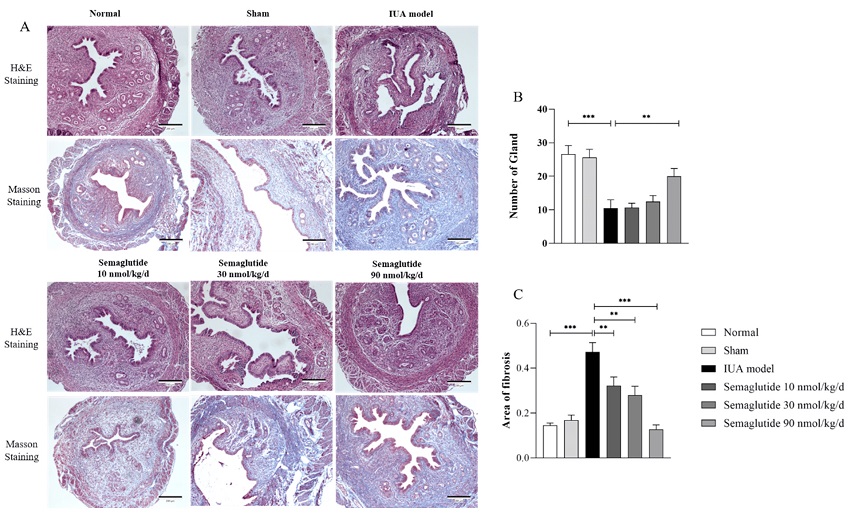Nikhil Prasad Fact checked by:Thailand Medical News Team Jun 06, 2024 1 year, 6 months, 3 weeks, 3 days, 17 hours, 3 minutes ago
Med News: Intrauterine Adhesions
Intrauterine adhesion (IUA) is a medical condition that affects women's reproductive health. It often manifests as irregular menstruation, pelvic pain, infertility, and recurrent miscarriages. Studies show that around 31.6% of women of childbearing age may suffer from IUAs. Traditionally, hysteroscopy is used to diagnose and treat IUAs, but it has limitations like high recurrence rates and complications. Current treatments, including the use of intrauterine devices (IUDs) and estrogen, have their drawbacks, including the potential for secondary uterine damage and inflammation.
 Semaglutide (Ozempic, Wegovy) Shows Promise in Treating Uterine Scarring
What is Semaglutide?
Semaglutide (Ozempic, Wegovy) Shows Promise in Treating Uterine Scarring
What is Semaglutide?
Semaglutide is a glucagon-like peptide-1 (GLP-1) receptor agonist that was approved by the FDA for diabetes treatment in 2017. Semaglutide is the key component found in Ozempic, Wegovy, and Rybelsus. These medications are prescribed for weight loss in certain patients, helps lower blood sugar levels, and reduces the risk of significant cardiovascular incidents, such as heart attacks or strokes, in specific individuals. This medication has shown benefits beyond diabetes management, including cardiovascular protection and weight loss. GLP-1 receptor agonists, like Semaglutide, have anti-inflammatory, antioxidant, and anti-fibrotic properties. These properties make Semaglutide a potential candidate for treating fibrotic diseases like IUAs.
The Study on Semaglutide's Effects on IUAs
Researchers from Chinese Academy of Medical Sciences & Peking Union Medical College, Beijing-China and the Lanzhou University-China aimed to explore the effects of Semaglutide on intrauterine adhesions. The study covered in this
Med News report, involved both cell and animal models to simulate IUAs. The cell model used human endometrial epithelial cells (HEECs) induced with a substance called TGF-β1, while the animal model involved mice subjected to mechanical curettage and inflammatory stimulation.
Methodology
The study tested various concentrations of Semaglutide on both models. For the cell experiments, HEECs were treated with different concentrations of Semaglutide, and their viability was assessed. In the animal model, mice were divided into groups, with some receiving daily doses of Semaglutide for two weeks, while a control group received sterile water.
Findings
-Impact on Cell Viability
The study found that a 20 µM concentration of Semaglutide had a significant impact on HEECs induced with TGF-β1. This led to the selection of three concentrations (0.1 µM, 1 µM, and 10 µM) for further cell experiments.
-Reduction in Fibrotic and Inflammatory Indicators
Semaglutide significantly reduced the mRNA levels of fibrosis markers (ACTA2, COL1A1, and FN) and inflammation markers (TNF-α, IL-6, and NF-&
kappa;B) in both cell and animal models. In the mice, Semaglutide improved endometrial morphology, increased the number of endometrial glands, and reduced collagen deposition, indicating a reduction in fibrosis.
-Inhibition of Epithelial-Mesenchymal Transition (EMT)
EMT is a process where epithelial cells transform into mesenchymal cells, contributing to fibrosis. The study found that Semaglutide inhibited key markers of EMT (vimentin, E-Cadherin, and N-Cadherin) in both models. This suggests that Semaglutide can prevent the cellular changes that lead to fibrosis.
Discussion
The study indicates that Semaglutide can effectively improve fibrosis and inflammation in IUAs, likely by inhibiting EMT. This is significant as current treatments for IUAs have limitations and potential side effects. Semaglutide offers a promising alternative that could lead to better patient outcomes with fewer complications.
Implications for Future Research
While the results are promising, further research is needed to fully understand the mechanisms by which Semaglutide operates. This includes exploring its effects on other fibrotic diseases and investigating the long-term benefits and potential side effects in a clinical setting.
Conclusion
Semaglutide, originally developed for diabetes management, shows significant potential in treating intrauterine adhesions. By reducing fibrosis and inflammation and inhibiting EMT, it offers a new avenue for improving women's reproductive health. This study lays the groundwork for future research and potential clinical applications of Semaglutide in treating fibrotic conditions.
The study findings were published in the peer reviewed International Journal of Molecular Sciences.
https://www.mdpi.com/1422-0067/25/11/6196
For the latest
Med News, keep on logging to Thailand Medical News.
Read Also:
https://www.thailandmedical.news/news/much-sought-after-overpriced-obesity-drug-wegovy-by-novo-nordisk-found-to-lower-adverse-cardiovascular-events-by-20-percent
https://www.thailandmedical.news/news/breaking-u-s-fda-study-discovers-that-diabetics-taking-glp-1-receptor-agonists-drugs-have-higher-risk-of-acute-cholecystitis-and-death
